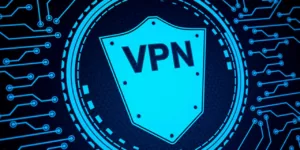The internet is a great tool whether it’s working remotely, keeping in touch with family and friends or gaining access to the latest movies and streaming them. However, while there is a great deal of good there is a downside too. Hackers and thieves utilise the internet for their own means. While virus and malware software helps, they are not enough. Thankfully, there is a way of gaining added protection online and this is a VPN. So, how does a VPN protect personal data?
Why you might need a Virtual Private Network
Today we use computers, smartphones, and tablets to do just about everything. People use them to bank online, chat to friends, and browse the internet, shop online, book holidays, flight tickets and more.
Online banking and shopping are two uses of the internet where personal details, including bank account and credit card numbers, are regularly used.
Anyone with a little knowledge could intercept your personal details and use them to their advantage. The threat is even more prominent if you use free WiFi hotspots when out. Hackers can prey on people who use free WiFi, by intercepting or by setting up their own hotspots to mimic that of a genuine trustworthy one. Connect to such a network and the hacker gains instant access to whatever you send over the internet, including credit card, debit card, and bank account details.
What is a VPN?
A VPN is a Virtual Private Network and it can work alongside virus and malware protection, along with firewalls.
A VPN offers numerous benefits with one of them being added security online. Other benefits include allowing the user to browse anonymously, bypass geo-restrictions and overcome censorship.
Internet users can take out a plan with one of the VPN providers on the market to gain all of the above benefits and more. Providers offer a range of apps for various devices that can be installed and used to provide protection, security, anonymity and more.
How does a VPN protect personal data?
A Virtual Private Network works by placing a virtual tunnel between the user and the World Wide Web.
Any information the user sends out onto the internet is encrypted. This makes the data impossible to read even if someone were to be able to intercept it. If they cannot read the information, they have no idea what it is and it is no good to them.
Along with encrypting information, the Virtual Private Network allows the user to mask his or her IP address and replace it with one from another server.
The user can choose from a wide range of servers from around the world. Once connected to a server via an app the user could essentially be located halfway around the world from their actual location.
How to protect your data with a VPN
The steps to protect personal data using a VPN are as follows:
- Choose a provider and sign up for a plan. Paid upfront plans often work out cheaper than paying month to month
- Download apps to the devices you use to connect to the internet and install them
- Launch the app and sign in using the credentials made at the time of signing up
- Using the VPN dashboard choose a server location and connect to that server
- Open your web browser or app and enjoy the internet with the security of a virtual tunnel and alternate IP address.
To Summarise
Once you have established a secure VPN connection with a provider you do not have to worry about anyone being able to intercept your personal information. A Virtual Private Network can be a valuable tool for anyone who values his or her privacy, wants to remain safe and secure or cares about anonymity.
You also don’t have to worry about your ISP finding out what you see and do online, including Torrenting.
The Virtual Private Network can also be used to gain access to geo-restricted content or overcome censorship. You can use websites that might be blocked due to location or stream content that is only available in certain countries, simply by connecting to a server in that country.








